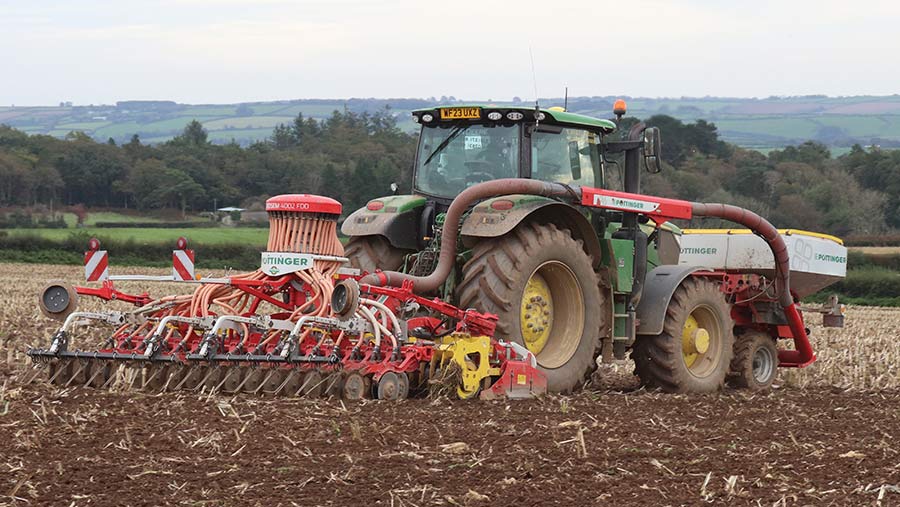A&B Contractors’ tractor replacement policy under scrutiny
 © Andrew Faulkner
© Andrew Faulkner There’s a shortage of cash in the entire farming system, according to Richard Barrow, who co-owns and manages A&B Contractors, based at Porte Farm, Kentisbury, north of Barnstaple.
“Ten years ago, for example, a six-figure credit facility with suppliers of items such as net wrap, twine and fuel was commonplace, whereas today that limit has typically been slashed to around £25,000.
And if you go a day over the stated settlement date, those suppliers are straight on the phone.
“It’s a similar situation for our farming customers. With reducing Basic Payment Scheme (BPS) income, lower commodity prices, inflated input costs and rising interest rates, they’re struggling, too.
Encouragingly, most of them are still paying us promptly or sending part payment, which is much appreciated.
See also: Perfect storm of price rises causing carnage for Devon contractors
Business facts
A&B Contractors, Porte Farm, Kentisbury, Barnstaple, Devon
Main services:
- Contract farming supplying home-grown maize, wholecrop, cereals and straw
- 3,850ha grass silage; 485ha wholecrop silage
- 365ha maize drilling and harvesting
- 570ha combining
- 30,000 round bales
- 9,500 square bales
- ploughing and drilling
- shoot plot establishment, maintenance and aftercare
- umbilical slurry injecting/spreading with nurse tank
- muck and biosolids spreading
- vacuum tanking with dribble bar
Other: Seven-strong haulage fleet; concrete and groundwork services; timber processing and harvesting
Staff: 23 full-time on the ag business, up to 60 during seasonal peaks
About the contractor

From its base in Kentisbury, Devon, Richard Barrow’s A&B Contractors offers the full range of agricultural services, haulage and groundworks
Invaluable service
“I think there’s a realisation within the local farming community that they need larger contracting businesses such as ours to survive.
“Although we face price competition from one-man bands in this region, these smaller outfits don’t have access to comparable resources, which are often the difference in getting farmers out of a hole in an emergency.”
Richard cites a couple of recent examples.
“We had a phone call from a dairy farmer to say his telehandler had got stuck in the farm’s slurry lagoon and was sinking fast.
“Luckily, one of our guys had just returned to the yard, so he was able to head straight there with a wheeled loader and pull the customer’s handler out.
“Many more minutes, and it would have been completely submerged and, in all probability, written off.
“Earlier this autumn we had another customer with about 350 acres (140ha) of grass to cut and, due to unforeseen circumstances, he was unable to bale and cart the crop himself.
“Plus it would have taken him weeks to do.
“We worked out that it would’ve cost him about £35,000 to bale, wrap and cart, whereas we could fill his clamp with a forager and a couple of forage wagons for around £22,000 in just two to three days.
“We juggled our other work around to do the job, and the customer saved more than £10,000 in the process.”
Monitoring overheads
But such flexibility comes at a price – an ongoing dilemma for A&B. There’s a need for the company to trim overheads, but not to the detriment of the service provided.
“We’ve already reduced the tractor fleet by one, the lorry fleet by two, and the digger number has been cut from eight to seven. We’re also down a round baler and a rotary spreader.”
The planning challenge for A&B is that its workload and income are continuously changing, so it’s almost impossible to match capacity to demand exactly.
It’s a traditional contracting operation with 600-700 customers whose diverse requirements vary from 1,000ha of silaging to a few hours’ hedgecutting.
Every year the business gains new customers and loses others.
“It would be great to have the known income of fixed-term stubble-to-stubble and contract farming agreements, but that’s just not the reality of contracting in this area of predominantly smaller dairy, mixed and livestock farms,” Richard explains.
“Over the winter we plan for a certain level of work in the next season, but this can change literally overnight.”

© Andrew Faulkner
Tractor replacement
With a fleet of 20-plus tractors, this is clearly one of A&B’s most significant cost centres, both in terms of servicing/repairs and capital investment.
Historically, the firm’s strict policy has been to replace the tractors as their warranties run out at three years or 6,000 hours but, with cost-to-change figures continuing to rise, this approach is coming under scrutiny.
“Finance is a mix of four-year lease and hire purchase agreements.
“Suggestions are that we should be keeping the tractors longer, but I have my doubts.
“The last two tractors we held onto – a couple of John Deere 6195Rs – cost us £10,000 and £14,000 respectively in year four, their first year out of warranty.
“One was an engine repair, the other a gearbox replacement.
“Particularly galling was that we were paying off those repair bills at the same time as the final year of the tractors’ four-year finance agreements – the nightmare scenario for cashflow.
“In future, the likely compromise is that we’ll look at each tractor individually rather than stick with a blanket, out-at-three-years approach. Based on history and condition, some we’ll run on and take the risk; others we won’t.”
Finance principles
On finance, the underlying Barrow principle goes something like this: He puts down a £20,000 deposit on a £100,000 tractor, leaving £80,000 to finance over four years – so £20,000 paid per year.
At the end of the three-year warranty period, the tractor is worth £50,000, of which he uses £20,000 to make the fourth and final payment, allowing him to move the tractor on.
The remaining £30,000 in the pot then becomes the deposit for the tractor’s replacement.
“The theory works if you can get 0% finance, although interest normally needs to be factored in.
“It also doesn’t take account of price rises, but if the new machine prices creep up, then second-hand values should follow. If all goes to plan, the monthly payments should stay pretty much the same.”
A recent deal on a like-for-like New Holland T7.210 proves the point. The firm was offering 0% finance and a special T7 package for a specific spec.
Despite A&B’s outgoing T7 having been fitted with new tyres within the past six months, the dealer was prepared to take the tractor on its previous tyres, so A&B has ended up with a spare set of nearly new tyres, a new T7 on new tyres and a fresh warranty.
“The new T7’s monthly payments are marginally more, but this is largely down to signing up to a dealer service package.
“Servicing across the existing fleet averages £3,300/tractor a year, so the £10,250 servicing agreement for four years on the new T7 should give an overall saving of about £3,000.
“Importantly, if we move the tractor on after three years, we have the option to roll the fourth year of the servicing package into its replacement.”
So that’s the new policy: As each tractor comes up for change, Richard will stay loyal to his local dealers but look for “special” tractor packages and promotions, ex-demo units, subsidised finance and low-cost service agreements until he identifies an “affordable” option.
“Again, it’s all about keeping costs in check and reducing the risk, while still maintaining our existing level of service.”
Optimism for the future
Despite the present focus on cost control, Richard remains cautiously optimistic about the future.
“We have a loyal customer base, and, even if the emphasis does shift from food production into other land uses, the work will still be there – albeit a different type of work. We just need to be adaptable.”
Among A&B’s upcoming projects is assisting New Holland with developing its methane tractor for contractors.
The immediate challenge is to increase the tractor’s methane-carrying capacity so it’s able to operate away from base for longer contractor-type days.
Kit list
- Tractors John Deere 6R215, 6195R (x3), 6155R (x8), 6830, 6630, 6140M; New Holland T7.210 (x4); JCB Fastrac 4220
- Combines John Deere T550 (x2)
- Foragers John Deere 8600 and 7380i
- Forage wagons Pottinger Torro (x2)
- Handlers JCB 542-70, 536-60 and 531-70; Hyundai skid-steer
- Sprayers Bateman RB35 (36m/4,000-litre); Kuhn 12m mounted; Amazone 24m mounted
- Drills 2.5m, 3m and 4m combination drills; Vaderstad 4m Rapid drill; Moore direct drill; Hatzenbichler 6m air seeder; Accord 12-row fodder beet drill; Kuhn eight-row maize drill; Accord six-row maize drill
- Diggers JCB 3CX; six swing shovels 0.5t to 22t
- Main other kit Mower combination (x2); square balers (x3); round balers (x3); rakes (x4); wrappers, silage trailers (x10); fertiliser spreaders (x2); ploughs (x4); slurry tankers (x5); muckspreaders (x10); assorted umbilical equipment.
Read more from our monthly Contractor Comment series

